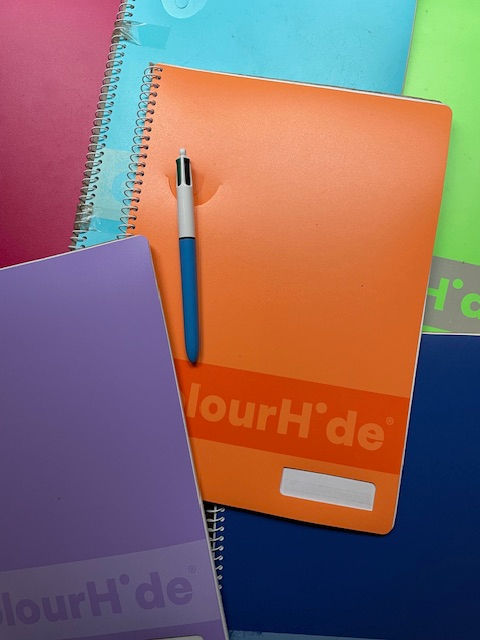
And I Quote
By Chris Shaw - GCWA Member
I swore to myself I would not fall down the rabbit hole of resources. Like I did when I dove headlong into drumming. Giving full heed to my percussive desires, it wasn’t long before I had acquired so many instructional DVDs, books and magazines, it would take me five millennia to work through them all. But sure enough, with writing too, I had soon completed several online courses, attended numerous author talks, subscribed to a plethora of podcasts and filled several notebooks with information, inspiration and instruction, gleaned from numerous books. Although my rabid information consumption hasn’t yielded anything tangible, a published book for instance, I do have a few quotes I can share – scribbled down, torn from one of the bright-covered, ColourHide notebooks populating my writing space, and sticky taped by a jagged edge to the hutch above my desk. In no particular order —
“This is what I find most encouraging about the writing trades: They allow mediocre people who are patient and industrious to revise their stupidity, to edit themselves into something like intelligence.” ― Kurt Vonnegut, 1922–2007.
Kurt’s self-deprecating, tongue in cheek assessment made me laugh, as well as gave me hope and encouragement. With all the resources available, it’s possible to have the charisma of toothpaste and the intellect of a frog and still create something admirable if I am willing to work hard and persevere.
“When something can be read without effort, great effort has gone into its writing.” — Enrique Jardiel Poncela
A sagacious exhortation for the perfectionist. It is worth the extra hours spent rewriting that sentence. Sometimes something niggles, it just doesn’t sound or look right. It’s worth persevering to get it right. Not to make it sound menial, but good writing is comparable to cleaning in a way. No-one is going to complain unless you miss a spot. It’s nice to read a sentence or a paragraph that doesn’t need re-reading multiple times to work out who said what, or leave one feeling lost in a labyrinth of overwrought detail.
“Every clause should bring value to the sentence. Every sentence should bring value to the paragraph, and every paragraph should bring value to the scene.” — Brad Parquette. The Novel Matrix.
A good reminder to keep the narrative flow without superfluous text. Writing to 500 or 1000 word limits really helped me winnow out wasteful words. It’s a good exercise in economy and can only help when extended out to novel length. And of course, every word should bring value to the clause… every scene should bring value to the chapter, every book should bring value to the library etc.
“Realistic goals should harness your natural strengths, talents and preferences to propel you forward while preventing your weaknesses, limitations, and aversions from tripping you up.” — Author Unknown.
This sounded really good when I read it. So simple. Yet, so hard. It’s oxymoronic that my weaknesses are so strong. There is a reason there is no such thing as an ‘amateur’ crastinator. At the very least, it’s good to be aware of my strengths and weaknesses (even if ingrained habits take time to reform).
The next two aren’t from writers, but they struck me as equally poignant when it comes to writing.
“I don’t see fear in my life. That’s how people die – they are frozen rather than thinking then acting.” — Phillipe Petit. Highwire Artist.
Such a formidable mindset. In the context of tightrope walking between the twin towers of the World Trade Centre in ’74, Petit makes a choice to ignore fear, displacing it with careful, critical planning and then acting in the confidence this brings. Even though putting our writing out there may feel nerve wracking, it’s less consequential than plummeting four hundred metres onto concrete, should we fail. However, our ideas and opportunities may die if we entertain the negative, rather than thinking objectively then moving ahead.
“To be vulnerable, you have to have incredible courage.” — Shaun Thomson. World Surfing Champion, 1977.
Similar quotes on vulnerability abound, from Sigmund Freud to Brene Brown, but seeing as I started this blog referencing resources, and it’s nearly knock off time, I think it fitting to finish with a resource. I’ll conclude by straying from the neural pathway and quoting an AI overview on vulnerability:
“Vulnerability requires courage because it involves facing uncertainty, emotional risk, and potentially exposing oneself to judgement or rejection. It’s about showing up authentically, even when you don’t know how things will turn out.”